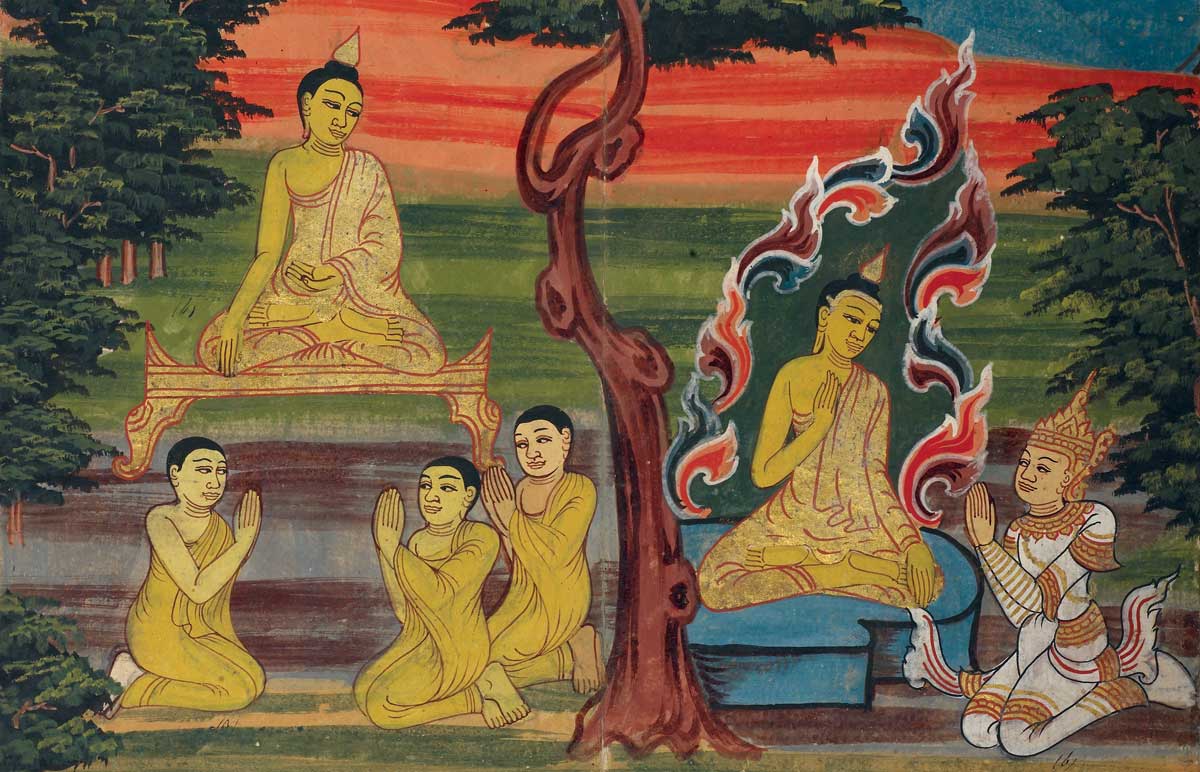Devadatta is a significant figure in Buddhist mythology, known for his complex character and his role in the life of the Buddha. He was a cousin of Siddhartha Gautama, who later became known as the Buddha. Devadatta is often portrayed as a rival and antagonist to the Buddha, embodying the qualities of jealousy, ambition, and desire for power. His story reflects the struggle between enlightenment and ignorance, showcasing the challenges that arise even among those who are close to the path of spiritual awakening.
Early Life of Devadatta
Devadatta was born into a noble family, just like the Buddha. He was raised in a privileged environment, which provided him with access to education and resources. Despite this, Devadatta’s early life was marked by a sense of dissatisfaction. He grew up in the shadow of his cousin, who was destined to become a great spiritual leader. This feeling of inadequacy and envy would later drive Devadatta to take actions that would put him at odds with the Buddha.
 Dalai Lama
Dalai LamaAs a young man, Devadatta was drawn to the teachings of the Buddha. He initially followed the same path of renunciation and meditation. However, his motivation was different. While the Buddha sought enlightenment for the benefit of all beings, Devadatta was primarily focused on gaining personal power and recognition. This fundamental difference in their intentions set the stage for the conflict that would develop between them.
Devadatta’s Rivalry with the Buddha
The rivalry between Devadatta and the Buddha escalated as both men began to attract followers. Devadatta wanted to establish his own sect that would rival the Buddha’s teachings. He believed that he could create a more stringent version of Buddhism that emphasized strict ascetic practices. This desire for recognition and authority drove him to make several attempts to undermine the Buddha and his teachings.
One of the most notable attempts by Devadatta to discredit the Buddha involved a plot to kill him. Devadatta hired assassins to carry out this plan, hoping to eliminate his rival once and for all. However, each attempt failed, often in miraculous ways that further reinforced the Buddha’s reputation. These failures only fueled Devadatta’s anger and determination to prove himself as a worthy opponent.
 Dakinis
DakinisDevadatta’s Teachings and Practices
Devadatta proposed a number of teachings that were in direct contrast to those of the Buddha. He advocated for extreme asceticism, arguing that the path to enlightenment required severe self-denial and harsh discipline. This approach attracted some followers who were drawn to the idea of rigorous spiritual practices. However, the Buddha emphasized the importance of the Middle Way, which promotes a balanced approach to life and spiritual practice.
Devadatta also attempted to impose strict rules on his followers, including prohibitions against certain foods and practices. He believed that by adhering to these rules, one could achieve a higher state of purity. However, these teachings often led to division and conflict among his followers, as many found the strict regulations difficult to maintain. This further illustrated the challenges of dogmatism within spiritual practices.
The Symbolism of Devadatta
In Buddhist mythology, Devadatta serves as a symbol of the darker aspects of human nature. His character embodies qualities such as jealousy, ambition, and the desire for power. These traits are often seen as obstacles on the path to enlightenment. The story of Devadatta serves as a reminder that even those who are close to the teachings of the Buddha can be led astray by negative emotions and desires.
 Shoten
ShotenFurthermore, Devadatta’s actions highlight the importance of intention in spiritual practice. While the Buddha sought enlightenment for the benefit of all beings, Devadatta’s motivations were rooted in ego and a desire for control. This contrast illustrates the idea that the path to enlightenment requires selflessness and compassion, rather than ambition and rivalry.
Devadatta’s Downfall
Despite his initial successes in attracting followers, Devadatta ultimately faced a downfall. His extreme practices and harsh rules led to disillusionment among many of his followers. Over time, more individuals began to recognize the wisdom of the Buddha’s teachings and chose to return to the Middle Way. Devadatta’s inability to adapt and evolve ultimately resulted in the loss of his followers and influence.
Additionally, Devadatta’s attempts to harm the Buddha continued to backfire. In one famous story, he attempted to roll a boulder down a hill to crush the Buddha. However, the boulder ended up rolling back and injuring Devadatta instead. These stories serve to illustrate the concept of karmic retribution, where negative actions lead to negative consequences.
The Legacy of Devadatta
Despite his negative qualities, Devadatta’s story is an important part of Buddhist mythology. His character serves as a cautionary tale about the dangers of ego and ambition. It reminds practitioners that the path to enlightenment requires humility, compassion, and a commitment to the welfare of all beings. Devadatta’s legacy is a testament to the complexity of human nature and the struggles that can arise on the spiritual path.
Furthermore, the narrative of Devadatta encourages followers of Buddhism to reflect on their own motivations and intentions. It highlights the importance of self-awareness in spiritual practice. By recognizing the potential for negative emotions to arise, individuals can work to cultivate positive qualities such as love, compassion, and understanding.
Lessons from Devadatta’s Story
The story of Devadatta offers several valuable lessons for those on the spiritual path. One of the most significant lessons is the importance of intention. As seen in the rivalry between Devadatta and the Buddha, intentions shape the direction of one’s spiritual journey. Practitioners are encouraged to examine their motivations and strive for selflessness in their actions.
- Self-Reflection: Devadatta’s story prompts individuals to engage in self-reflection and assess their own desires and ambitions.
- Humility: The narrative emphasizes the value of humility and the dangers of pride.
- Compassion: It encourages practitioners to cultivate compassion for all beings, rather than seeking power or recognition.
Additionally, the story illustrates the concept of karma. Devadatta’s negative actions led to his own suffering, reinforcing the idea that one’s actions have consequences. This serves as a reminder for practitioners to act with integrity and mindfulness in their daily lives.
Devadatta in Modern Context
In contemporary discussions about Buddhism, the figure of Devadatta continues to be relevant. His story is often used as a metaphor for the internal struggles that individuals face in their spiritual journeys. Many people encounter moments of jealousy, ambition, and doubt, similar to those experienced by Devadatta. Recognizing these challenges can be a crucial step in personal growth and development.
Moreover, Devadatta’s character can serve as a reflection of societal issues, such as competition and the desire for status. In a world that often values achievement and recognition, the lessons from Devadatta’s story are particularly poignant. They encourage individuals to prioritize spiritual growth over external validation and to foster a sense of community rather than rivalry.
Conclusion: The Complexity of Human Nature
The narrative of Devadatta is a profound exploration of the complexity of human nature. It illustrates how even those close to the path of enlightenment can be led astray by negative emotions. Devadatta’s story serves as a reminder that the journey toward enlightenment is fraught with challenges and requires constant vigilance and self-awareness.
Ultimately, the lessons drawn from Devadatta’s life are not just relevant to Buddhist practitioners but resonate with anyone seeking personal growth. By understanding the dynamics of rivalry, ambition, and the importance of intention, individuals can navigate their own paths with greater wisdom and compassion.
